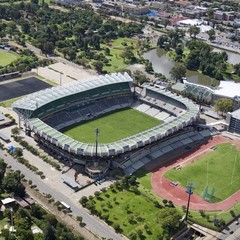
Johannesburg - The buzz from Africa's first soccer World Cup is being heard in investment houses across the globe, drawing new business and even capital to the continent that has evolved in the last decade from international basket-case to fast-growing frontier market.
"There's definitely been a pick-up in flows from Europe. There's no doubt about that," said John Mackie, head of African investments at Johannesburg-based Stanlib, which manages R2.2bn in sub-Saharan Africa's frontier markets.
His comments, supported by several other fund managers, are the first signs of South Africa accruing some of the "intangible" benefits needed to recoup the R40bn it spent on new stadia and upgrading roads and railways for the month-long soccer spectacular.
Analysts estimate the foreign fans who turned up - full arrivals numbers are not yet available - will only inject R13bn into the economy, while the government says the tournament should boost 2010 growth by 0.4 percentage points.
However, in the long-run it believes Africa's biggest economy will more than recover its costs through the rebranding of a nation noted mainly for violent crime, thereby attracting more tourists and investment.
The investment side already appears to be working as businessmen and money managers the world over have tuned in to watch a smoothly run tournament staged in packed and spectacular stadia before enthusiastic and well-behaved fans.
It is a far cry from the popular external image of Africa as a hopeless and hapless continent more accustomed to making headlines through war, pestilence, famine and death.
"People are sitting in Denmark and France and the UK saying 'That stadium looks a hell of a lot better than anything we've got here, and it looks like it works and everybody's still alive,'" Mackie said.
"There's no question it's changing perceptions."
Long-shot from Japan
Anecdotal evidence even suggests the soccer has swayed investment decisions as it has reached a television audience of billions in every corner of the globe.
Cape Town-based Investec Asset Management, the funds arm of South African bank Investec, reported inflated interest from Japanese investors in a recently launched $200m African commodities fund the day after Japan advanced to the knockout stages.
"After Japan won the football match we got another big subscription the next day," Global Business Development director John Green told Reuters.
Not everybody is quite so hasty, although serious investor interest - pricked in part by "Lion on the Move", a weighty and overwhelmingly positive report on Africa released last month by consultancy McKinsey - has never been as intense.
"It hasn't necessarily led to flows yet but the right questions are being asked," said Simone Lowe of Thames River Capital, who oversees a $50m fund investing in South Africa and less-developed markets such as Nigeria and Kenya.
"The interest is coming from all over - the US, UK and Europe. Obviously South Africa has been at the forefront, but the interest is definitely more widely spread."
Buying Africa
Market data backs up the hearsay.
Foreigners have been net buyers of South African equities in three of the four weeks since the World Cup started, according to the Johannesburg stock market.
Overall, during the tournament they have bought $398 million of South African stocks, even though the bourse's Top 40 index has dropped 2.6% and underperformed other emerging equity markets by more than 4%.
The ripples have been felt further afield.
Four days after 19 million people in the United States - the biggest soccer audience in US history - tuned in to watch their side lose to Ghana, the West African state's landmark 2007 eurobond strengthened dramatically.
By contrast, a eurobond from fellow frontier African economy Gabon which normally moves in lockstep with the Ghana issue was unmoved.
The sort of television exposure enjoyed by Ghana, as well as reports filtering back from South Africa by word of mouth, suggest businessmen and potential tourists are looking at the entire region with new eyes.
"I'd been led to believe that everybody who went to the World Cup was going to be kidnapped or murdered but it just hasn't happened," said Matthew Cooksley, a London-based management consultant.
"All my mates who went said they had the most fantastic time and the atmosphere was incredible."
- Reuters




 Publications
Publications
 Partners
Partners








